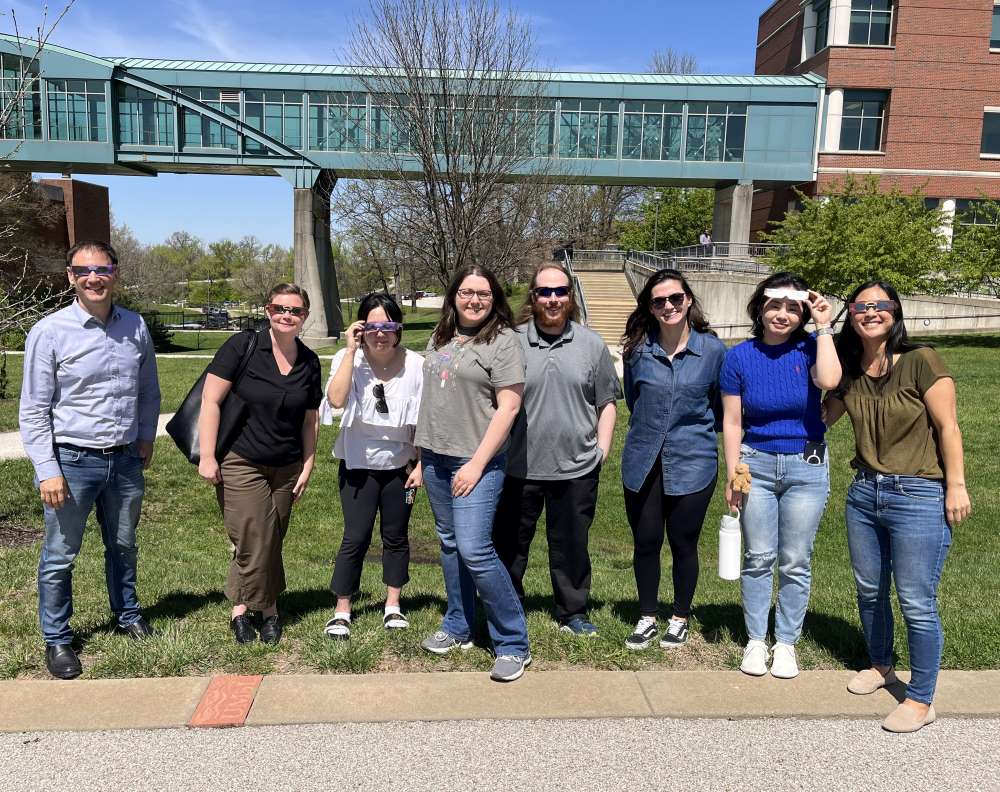The doctoral program is designed to provide students with a command of criminological knowledge and analytical skills.
Professional competence in theory and research methods is expected, as is in-depth knowledge in an areas of specialization. The doctoral degree is based on evidence that candidates have achieved a high level of scholarship and proficiency in research. The proficiency of students and their ability to work independently are assessed through course grades, qualifying papers (fulfilling the comprehensive examination requirement), and successful defense of the dissertation.
There are three major components of the Ph.D. program: coursework, qualifying papers, and the dissertation. The Ph.D. program is 60 credit hours total, and includes 45 hours of coursework, directed readings during the qualifying papers stage, and a minimum of 6 credit hours of dissertation research. Students can register for up to 9 hours per semester, and classes are generally 3 hours each. This includes the following courses:

Required Core Courses (24 hours)
CRIMIN 6405: Methods
CRIMIN 6410: Statistical Applications in CCJ
CRIMIN 5415: Foundations of Criminological Theory
CRIMIN 6420: Contemporary Criminological Theory
CRIMIN 6450: Criminal Justice Theory and Policy
CRIMIN 6480: Multivariate Statistics in Criminology
CRIMIN 6465: Qualitative Research Design
CRIMIN 6470: Quantitative Research Design
Seminar courses (at least 12 hours)
CRIMIN 6440: Nature of Crime
CRIMIN 6441: Juvenile Delinquency
CRIMIN 6442: Communities and Crime
CRIMIN 6443: Violent Crime
CRIMIN 6448: Victimization
CRIMIN 6452: The Police
CRIMIN 5533: Philosophy of Law
CRIMIN 6430: Law and Social Control
CRIMIN 6436: Comparative Criminology
CRIMIN 6422: Law, Courts, and Public Policy
CRIMIN 6454: Corrections
CRIMIN 6471: Evaluating Criminal Justice Interventions
CRIMIN 6438: Inequalities in Criminal Justice
CRIMIN 6550: Seminar in Criminology and Criminal Justice
Elective courses within or outside CCJ (at least 9 hours)
CRIMIN 6485: Directed Readings
CRIMIN 6495: Internship
Other courses at the 5000/6000 level not counted toward the 12 hours above.
Dissertation hours (at least 6 hours). Students may enroll for dissertation credits only when all other degree requirements have been completed.
CRIMIN 7499: Ph.D. Dissertation Research
Qualifying Papers
Graduate students in the doctoral program are not officially classified as PhD candidates until they have passed the Qualifying Papers. The goal of the qualifying papers is to establish a student’s familiarity with the substantive literature, demonstrate theoretical and methodological expertise, communicate their work effectively, and demonstrate an ability to imaginatively, logically, and creatively use this knowledge to address research questions within the broad realm of criminology, criminal justice, punishment, and the legal system. Qualifying papers consist of two papers: an empirical research paper and a theory paper. A three-member Qualifying Papers Committee reviews the two sole-authored papers that are submitted to the Graduate Director within nine months of the completion of all coursework.
The Dissertation
The dissertation is required of all PhD candidates and demonstrates the student's scholarly expertise. The dissertation process formally begins when all other requirements of the PhD program have been met. The dissertation is original research on a topic that is substantively significant, and is a highly individualized project developed in guidance by a dissertation committee. They can take different forms, but may include a book manuscript, linked papers with an overarching research question, or another format approved by the Dissertation Committee Chair. Students need to work closely with their dissertation chair and committee, and the committee needs to approve of the project. Ph.D. dissertation committees are selected by the student at the time when the student is preparing for their dissertation proposal. The dissertation committee assists in selecting and developing the research question and evaluates the student's work on that question. Students should work with chair and committee members to develop their project.
Please see the Graduate School for more information about the doctoral degree.
APPLICATION REQUIREMENTS
What is the application deadline?
For the PhD program, the deadline is January 20th for enrollment the following Fall.
Is it possible to submit unofficial transcripts for application purposes?
We prefer official transcripts for all PhD applicants. You can submit unofficial transcripts for the application process but if admitted you will need to provide official transcripts within one semester.
Would I be able to use a co-authored publication, where I am the first author, as my writing sample?
We encourage student publications, but we would prefer a sole-authored paper as the writing submission. We are looking for writing samples that convey independent thinking and analysis. Ideally, we would ask applicants to submit a sole-authored paper - a class paper or a chapter of a thesis is welcomed. The concern with including a co-authored publication is that it is difficult to tease out an applicant’s contribution from that of the co-author’s. If you would like to submit a co-authored paper, please include a statement as to why/how this represents your writing as opposed to your co-author’s. We require a CV/Resume as part of the application packet where students can include a listing of co-authored scholarly products. Finally, students are encouraged to describe their accomplishments in their statement of purpose, as well.
Are all three letters of recommendation meant to come from academic sources, or can one be a professional source?
The letters of recommendation are intended to convey a student's potential for success in the PhD program. While we prefer that all three letters of recommendation come from academic sources, we allow non-academic references, particularly if an individual has been separated from an educational program for an extended period of time. In those cases, supervisors or other professionals may be able to speak to an applicant's potential for success in the program.
Is there anything I should be doing to bolster my application?
The review committee takes a holistic approach to reviewing applications and considers a student’s motivation to pursue the PhD and the student’s potential for success in completing our program. If available, we encourage students to work with faculty on research while in their undergraduate or graduate programs. Taking time to study for the GRE can be fruitful and free study materials are available. We also take great care to review letters of recommendation, statements of purpose, and writing samples. Please provide ample time for referees to complete the letters of reference and provide letter writers with your statement of purpose, transcripts, GRE scores, and other relevant materials so that they can write well-informed letters of reference. Finally, please ensure that all materials are submitted to the graduate school before the deadline, as late applications are not accepted.
Can you waive the TOEFL (Test of English as a Foreign Language) requirement?
There are several situations where international admissions will waive the requirement of the TOEFL. For a complete list of requirements for a waiver, see the International Admissions website: https://www.umsl.edu/global/admissions/englishrequirements.html
What are the GRE requirements for this program?
We consider all elements of the application and don’t focus solely on GRE scores. Over the past 2 years, the average GRE scores for our admitted students have been around 150 to 155 for each category and 4.0/4.5 for writing. However, these are averages and while we do consider these quantitative indicators, we also take into consideration the statement of purpose, writing sample, and letters of recommendation when evaluating applications.
How do you calculate GRE scores for admission? Do you factor a composite of verbal and quantitative scores or do you treat both scores separately?
We consider the quantitative GRE scores separately, as well as combined. We also consider the analytic writing component as part of our deliberations.
What is the university code to send my GRE score to?
The school code for the GRE is 6889.
Do I have to take the GRE or is it waived?
We are still requiring the GRE but if an individual has extenuating circumstances related to COVID 19 or a similar situation that precludes him/her from fulfilling this requirement, please reach out to the Graduate Program Director (ccjgraduate@umsl.edu).
What if I am an international student?
Questions on international admissions go through UMSL Global. They can be emailed at intadmission@umsl.edu.
ADMISSIONS DECISIONS
How many applicants typically apply and how many are admitted?In recent years, we have received approximately 45 applications and admit 8 to 10 applicants. Our cohorts are small, with the hopes of 4 to 5 students in each cohort per year.
Do most of your admitted applicants have their masters degree?
The number of admitted students who have their masters versus their bachelors degree fluctuates pretty widely each year, but we typically have at least one student per year who comes in with his or her bachelors.
Does the department send out a decision via mail or will it be an email?
For the PhD program, we call those whom we are admitting to the program and the graduate school sends a letter to those who are not admitted to the program. We typically make our decision by mid-February. In past years, we have instituted a wait list, so some admission offers may come in the spring.
What happens after I am admitted to the program?
First, we invite our admitted cohort to visit UMSL and the department for a couple of days, usually in early March. During this visit, the admitted students can meet our faculty and current PhD students, see the campus, and learn more about the program.
FUNDING/ASSISTANTSHIPS
Do I have to apply separately for the assistantship, or it will be considered while reviewing applications?
You do not have to apply separately for the assistantship. We are committed to funding all full-time admitted PhD students. Students can decline, but an assistantship is extended to all full-time students admitted to the PhD program. All students interested in being a funded student have until April 15th to decide whether they would like to accept or decline the admission offer. More information can be found at the Graduate School.
What are the assignments and stipends of an assistantship?
Each assistantship is 20 hours/week as either a graduate research assistant, graduate teaching assistant, or course instructor (for those who have a masters degree). Assistantships are contingent on a student maintaining satisfactory academic progress. Current stipends are 12-month stipends totaling $21,600.
Does the assistantship come with tuition and/or health benefits?
Our assistantships come with tuition remission of up to 12 hours each semester (6 in the summer). Assistantships do not include health insurance/benefits.
CAREER PLACEMENT
What type of placements have your recent PhD graduates had?
The majority of our PhD graduates enter academic positions, although not all. A listing of the job placements for our recent PhD graduates can be found on our website.
CLASS TIMES
When are classes offered?
Our PhD program typically offers classes from 5:30-8:10 pm with one course per night (M-Th). We occasionally offer some classes during the day, but offerings vary by semester.
Can I complete the PhD program online?
No, we only offer our PhD courses in a traditional in-person format.
I have a full time job, is the PhD program something I could successfully complete while working full time?
Yes, you can complete the program part time, and we have had a number of students who have completed our program this way. Full time students take up to 3 courses per semester and part-time students take 1 or 2 courses per semester.
How long does it take the complete the program?
The typical timeline for CCJ students ranges from 4 to 6 years with the majority graduating within 5 or 6 years. This time to completion depends on whether students enter with a masters degree, the number of credits transferred in from that masters degree, and whether they are a part-time or full-time student. According to Graduate School policy, all PhD students must complete the doctoral degree within 8 years of registering for their first course.
For additional information, please email ccjgraduate@umsl.edu, or Dr. Marisa Omori, Director of Graduate Studies at marisa.omori@umsl.edu.

